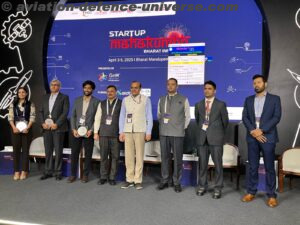- Pioneering UK-based electrification company, Equipmake, joins forces with Australia’s Gilmour Space on its commercial hybrid rocket programme.
- Equipmake will be responsible for the development and supply of an advanced electric motor system for Gilmour Space’s Eris rockets.
- State-of-the art APM ‘spoke architecture’ motor delivers unprecedented levels of efficiency and performance, capable of operating under the intense pressures of launch and in the vacuum of space.
- First flights of Australian-built rocket planned by Gilmour Space for the first half of 2023.
Monday 10th October 2022: Global electrification specialist Equipmake has been selected by Australia’s leading space company, Gilmour Space Technologies, to support its commercial space rocket programme with the supply of advanced electric motors and inverters.
Led by former F1 engineer Ian Foley, Equipmake has built its reputation developing advanced EV technology for automotive OEMs and specialist supercar manufacturers, offering a complete suite of solutions from electric motors to power electronic systems, and complete EV drivetrains for buses.
Based in Norfolk, UK, Equipmake has expanded its operations to apply its pioneering technology in the aerospace, agriculture, marine, mining and off-highway sectors, and by partnering with Queensland-based Gilmour Space, is now set to make the exciting move into space manufacture.
Venture capital-backed Gilmour Space specialises in developing lower-cost solutions, most notably an innovative hybrid propulsion system, for launching small satellites into orbit. After conducting its first hybrid rocket test flight in 2016 and signing a Space Act Agreement with NASA in 2018 to collaborate on various space research, development and education initiatives, Gilmour Space began looking for a partner to design, engineer and supply a bespoke electric motor and inverter system to integrate with its orbital-class Eris rocket engines.
The project requirement parameters are highly demanding. The systems must be exceptionally lightweight yet highly robust, capable of surviving the intense forces of launch and performing flawlessly in the vacuum of space.
Equipmake and Gilmour Space began initial work on the project in late 2020. Having already developed a range of high-power density motors, Equipmake was able to utilise its considerable experience in weight-reducing technology to meet Gilmour Space’s stringent requirements for power and weight.
The electric motor’s rotor uses Equipmake’s proprietary rotor design, in which the permanent magnets are arranged like the spokes of a wheel to deliver a significant performance advantage in a very challenging operating environment.
Ian Foley, CEO, Equipmake said: “It is an honour to have been chosen by a company of the calibre and ambition of Gilmour Space to assist in providing technical solutions for its innovative hybrid rocket launch programme. Developing the extremely lightweight, exceptionally high-energy-density electric motor and inverter unit was one of the most challenging and exciting projects we have undertaken at Equipmake.
“Our EV technology is bringing a step change to the world’s most advanced electric cars and buses, as well as the marine, off-highway and mining sectors. However, space represents a completely new sector for us, and an endeavour which Equipmake’s team is very excited about. Working alongside engineers at Gilmour, we delivered the required technical solution, and now look forward to the launch of the first Gilmour Space commercial Eris rocket in 2023.”
Adam Gilmour, Chief Executive Officer, Gilmour Space said: “It goes without saying that delivering rockets into space is an exceptionally demanding exercise, and one which allows for little margin for error. With a flexible, agile approach and ‘can-do’ attitude in completing the design, build and test of this new electric motor, the team at Equipmake has been great to work with.
“We’ve come a long way at Gilmour Space to develop Australia’s first orbital launch capability, and the team is very excited to see Eris launch into space next year.”




























































































































